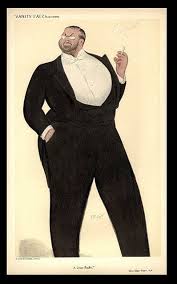
Max Beerbohm’s treatment of John Singer Sargeant. Both knew about “elites.”
Many years ago “Where the elite meet to eat” was the motto of the mythical but down-scale Duffy’s Tavern. Some may still remember it. But today when the elite meet to eat it may well be in a college food court. And that sends a guilt pang down the sciatic nerve, especially, I think, among classicists. We often seem especially guilt afflicted when the word “elitist” is spoken. A classicist friend, for example, writes, “In most colleges and universities that offer classics programs … many, many of the students ARE rich. “ And she went on to point out that I had beaten the drum “about the potential of on-line instruction to bring Latin and Greek - and so much more of Classics! - to those who are not fortunate enough to go to a private school or elite college. That would be a huge help to us all. “
I still think that’s true, though I have not convinced many people of it. But if for the foreseeable future many of our students will be disproportionately well-to-do, how troubling is it? Classicists are are only elitist, I think, if the stop pressuring the administrations of the schools in which they teach to do all they can to provide financial support to a broad range of students, or if they abandon their role in helping all students think through what it means to be an effective citizen in a deliberative democracy, and, as my friend puts it, “human beings who have the great gifts of minds, empathy, delight, intellect and the like.’
If we can help the next generation of our "elite" understand these things, rather than just $ $ $ , I think we should feel no guilt.
And, Oh, yes, while you’re thinking about elitism and democracy take a look at Scott Samuelson’s essay “Why I Teach Plato to Plumbers: Liberal Arts and the Humanities Aren’t Just for the Elite”
 RSS Feed
RSS Feed
